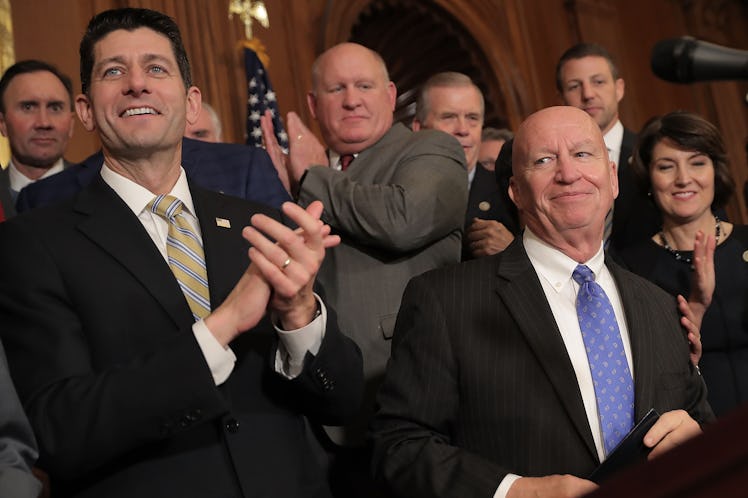
The GOP’s Tax Bill Isn’t Complete Yet & It Has To Get Past This Major Step
While President Donald Trump and Republicans in Congress had reason to celebrate the passage of a GOP tax bill during this past weekend, as it could give the party its first major legislative achievement of the year, those who are against the bill are probably wondering whether this is any reason to hope. That hope depends now on one occasion: Can the tax bill be stopped? After all, the bill isn't officially law yet, nor has it made it out of Congress.
The GOP's tax reform bill still has a major hurdle to get past, specifically because "the" GOP tax reform bill doesn't exist. There are actually two separate tax reforms bills that have been passed. One in the House of Representatives passed earlier in November and another one in the Senate, with major differences, passed this past Saturday, Dec. 2.
Because the House and Senate passed two bills that are similar and different at the same time — in that they both aim to change the tax code, but arrive at different methods (in some areas) to do so — Congress has to engage in what is called a conference committee before sending a bill to President Trump's desk.
The fate of tax reform depends on the ability of Republicans to negotiate during the committee process.
What Obstacle Does Tax Reform Have Left?
The conference committee process is meant to iron out the differences between two identical, but different bills that the House and Senate have passed. The committee is made up group of Congress members selected by leaders from each chamber.
The House selected its committee members on Monday, Dec. 4. After securing a majority vote to go to conference, House Speaker Paul Ryan (R-WI) named nine Republicans to the committee. House Minority Leader Nancy Pelosi (D-CA) name five Democrats. The Senate is expected to do the same — vote for conference, then select senators for the conference — later in the week.
In all, Republican tax reform has to get past four more major steps in Congress. The Senate needs to vote for the conference — like the House did on Monday — then a negotiated bill will need to be worked out via conference committee. The House would then have to vote on that bill. After that vote, if the negotiated bill passes, the Senate would then have to vote on the bill. Only then would it get sent to President Trump for signature.
Is There A Chance The Bill Won't Progress?
In any normal committee process, there is technically the possibility that committee members might not be able to come to an agreement on what a final bill looks like. There's also a possibility that when the committee does come to an agreement, that some members of the full Congress might change their minds when its time for the House and Senate to vote to approve the conference version of bill.
This is no normal conference committee process, however.
First, Democrats will have virtually no input, which has been the case since Congress began formally working on the plan. The Republicans aren't just trying to pass any tax reform bill, they're trying to pass a major bill before Christmas an earn legislative win before the year ends.
The prospect of Republicans failing to get a final bill to Trump, therefore, seem slim at this point.
Still, the House GOP and the Senate GOP's negotiations might see some measures not make it to the president's desk. For example, the Senate and House's respective bill's differ on how state and local taxes (SALT) should be treated by the federal government.
"There are a lot of these things that are floating back and forth, and it’s just impossible for me on your program or frankly to anybody else at this point to predict exactly how the final product turns out," Senate Majority Leader Mitch McConnell told a conservative radio host.
Then there's the big one, the Affordable Care Act's (ACA) individual mandate. Repealing the mandate is expected to essentially result in the collapse the ACA (aka Obamacare). As of now, however, only the Senate's tax bill includes the repeal. Whether the final bill includes the repeal will be decided via conference committee.
In short, the prospect of some high profile measures being stopped before they get to the president's desk is more likely than an actually Republican tax bill being stopped altogether. But, according to the ways the legislative process works, both are still possibilities at this point, even if only by technicality.